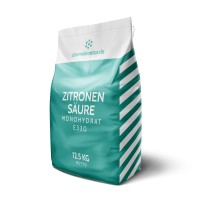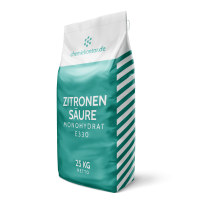Zitronensäure kaufen – die häufigsten Fragen:
Der pH-Wert von Zitronensäure liegt bei 2,3.
Bei chemiekontor.de wird Zitronensäure in Packungen mit 5 kg, 12,5 kg, 25 kg und bei einem erhöhten Bedarf in einem Behältnis von 750 kg angeboten.
Im Onlineshop von chemiekontor.de ist Zitronensäure schon ab 5,60 € per kg erhältlich. (Ab-Preis bezieht sich auf den Kauf einer Packung von 25 kg).
Zitronensäure ist in Regel versandfertig auf Lager, die Lieferzeit beträgt 3 – 5 Werktage.
P264 – nach Gebrauch Hände, Unterarme und Gesicht gründlich waschen. P280 –Schutzhandschuhe/Schutzkleidung/Augenschutz/Gesichtsschutz tragen. P305 + P351 + P338 – BEI KONTAKT MIT DEN AUGEN: einige Minuten lang behutsam mit Wasser spülen. Eventuell vorhandene Kontaktlinsen nach Möglichkeit entfernen. Weiter spülen. P337 + P313 – bei anhaltender Augenreizung: ärztlichen Rat einholen/ärztliche Hilfe hinzuziehen.
Für Zitronensäure ist keine CAS-Nummer vorhanden.



